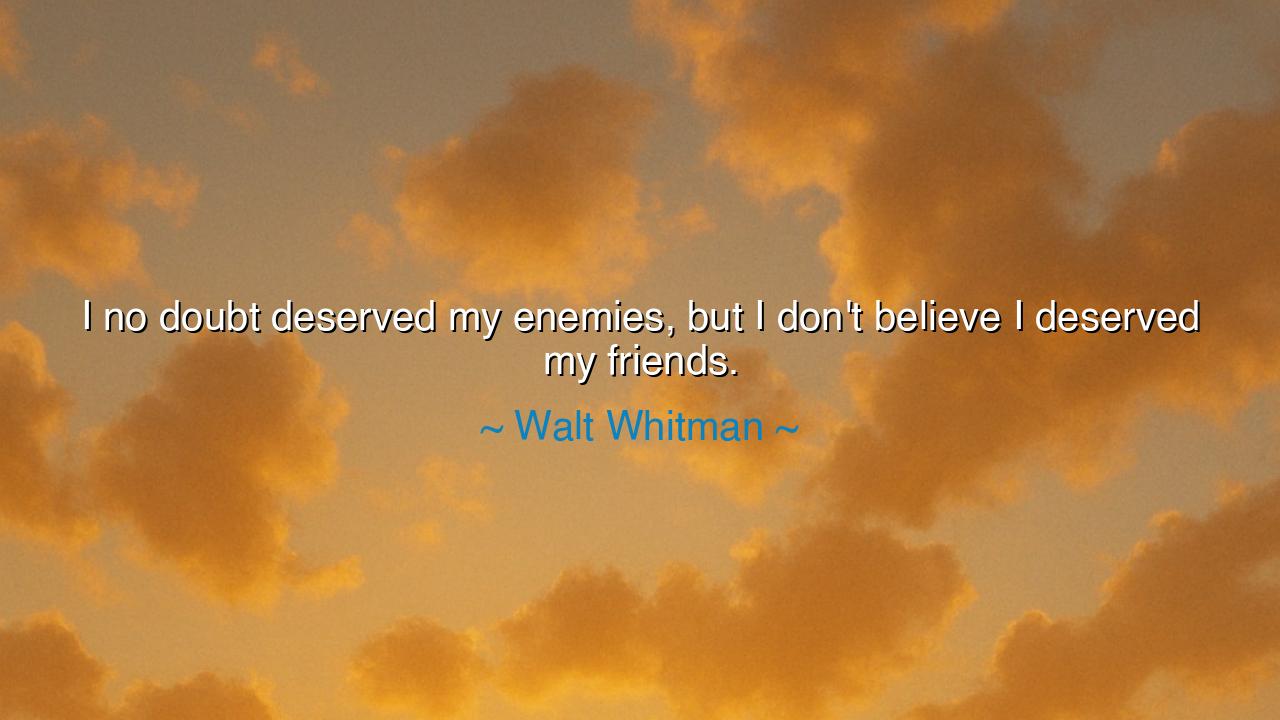
I no doubt deserved my enemies, but I don't believe I deserved my






"I no doubt deserved my enemies, but I don't believe I deserved my friends." – Walt Whitman
In the quiet depths of the soul, where our deepest reflections meet the truths of the heart, there lies an understanding that enemies often arise as natural consequences of our actions, our words, and our choices. Walt Whitman, the great poet of democracy and human nature, offers us a sobering, yet deeply poignant realization: the weight of our enemies is not always the burden of unjust persecution, but a reflection of the imperfect life we live. We are often drawn into conflict because of the very flaws that make us human—pride, anger, and misunderstanding. Yet it is his second reflection that carries a deeper, more profound wisdom: friendship—that rare and precious bond—is not always earned through merit but is a gift, a grace bestowed upon us by the hearts of others.
Consider the nature of enemies—those who oppose us, challenge us, or even seek to bring us down. In the course of a single lifetime, we may come to recognize that our adversaries often mirror the darker sides of our own nature. Perhaps we spoke hastily, or acted with reckless abandon, or perhaps we simply walked paths that clashed with those of others. Yet, our friends, those souls who walk beside us in the brightest and the darkest of times, often arrive without reason or calculation. They love us despite our flaws and mistakes, even when we are undeserving of their trust and loyalty. This is the mystery and the beauty of friendship: it is not an exchange, nor a simple reward for good deeds—it is a gift that transcends justice, a grace given freely and often without conditions.
The ancient Greeks, with their understanding of philosophy and human relationships, offered us a similar reflection through the words of Aristotle, who spoke of the three kinds of friendships: those based on utility, those based on pleasure, and those based on virtue. It is the last that Whitman speaks to—a friendship that does not depend on what we have done, but rather on the inherent goodness of the soul of the friend. It is a bond that forms not because of merit, but because of unconditional love and understanding. Friendship based on virtue transcends what is deserved and delves into what is freely given from one heart to another.
Consider the friendship of Socrates and Plato, two men whose minds shaped the very foundation of Western thought. Socrates, known for his questioning of everything, lived a life that was often filled with enemies, as his challenge to authority and tradition led him into great conflict. Yet, in the midst of his trials, he found in Plato a companion who loved him not for his fame or for the promise of advancement, but for the very virtue of his soul. Plato, in turn, would dedicate his life to preserving the wisdom of his teacher, and the bond between the two men transcended the trials of life and the enmity of society. This was a friendship not deserved, but one that was built on the purest forms of affection, trust, and mutual respect.
To understand Whitman’s words fully, we must reflect on our own lives and the relationships that have shaped us. How often have we been the recipients of friendship despite our faults, despite our past mistakes? How often have we found ourselves embraced by others when we felt unworthy of their affection? True friendship is not a reward—it is a profound gift that transcends merit, reaching into the realm of the divine. It is not earned, but given freely, in the same way that nature gives us the warmth of the sun, even when we are far from perfect stewards of the earth.
The lesson that Whitman imparts is one of humility and gratitude. It is not a lesson in deserving or earning, but in accepting and appreciating the friendships that come into our lives, often when we are least deserving. It teaches us that the most valuable things in life are not those we achieve by right, but those that are bestowed upon us through the generosity of others. In our friendships, we find that we are not alone in this world, that grace can still find us even when we are burdened with imperfections.
Thus, let us cherish our friends, not because we deserve them, but because they are the true treasures of our existence. Let us also remember that the greatest gift we can give to others is not the perfection of our being, but the acceptance of their imperfections, the recognition that friendship is a bond that exists beyond merit. So, when we look upon the friends who have entered our lives, let us be filled with gratitude and humility, knowing that they have chosen us despite our flaws, and in doing so, they have given us a gift greater than we could ever deserve.






AAdministratorAdministrator
Welcome, honored guests. Please leave a comment, we will respond soon